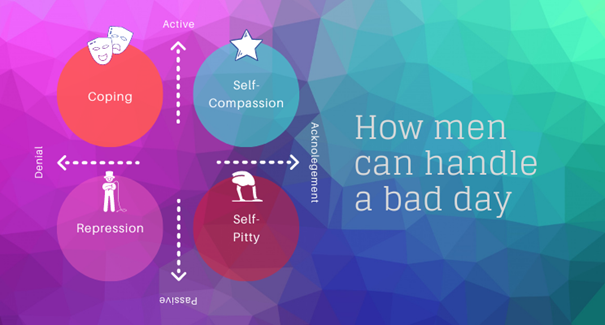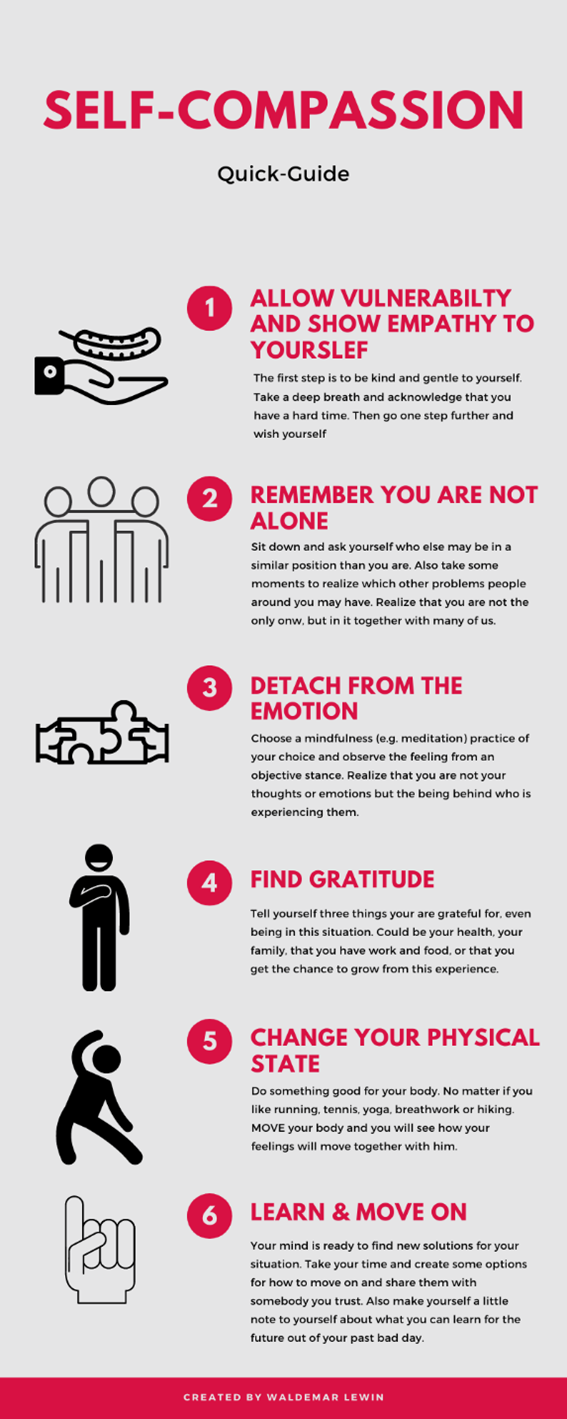This article is primary directed to men, but of course it may also be helpful for women. My intention is to open the field of compassion for men. I use generalizations and humour when it comes to some of my comments about gender specific behaviour and attitudes to make the reading more joyful. The message behind it is truly serious.
What are “bad days” and why do they happen to us?
When did you have your last “bad day”? I am talking about one of those days when our good mood is challenged by negative events, like a dispute with our boss at work. In those days’ emotions like fear, anger, guilt, shame or sadness arise without our conscious cooperation.
Emotions are so called “lower-level” responses, which are triggered via biochemical processes from our amygdala or the ventromedial prefrontal cortices. The idea behind that is simple: to bring us as fast as possible in a physical fight, flight or freeze state in order to survive in times of life-threatening situations. Experiencing these emotions has a direct impact on our physical state, like narrowing down our field of vision (fear, anger) and therewith forcing us to focus on a threat (like a bear) in front of us. If you want more details, feel free to click here)
Facing a bear that might be great, while facing a dispute at work is narrowing down our options into dead ends only. We may for example start yelling back (fight), saying nothing (freeze) or surrender (flight). Then we go home and feel bad – like a looser, a wimp or an idiot, … – and, ta-ta, there it is, our bad day!
Here’s a little extra knowledge for your next smart guy moment (Feelings vs. Emotions): Feelings are our personal reaction to emotions, and they are (in opposite to emotions) a subjective experience. That means that feelings are experienced pretty different between all of us, depending on our personal life history.
How can we handle bad days?
While the way we feel is different to all of us, we are similar in how we deal with those negative feelings. Especially we -men- tend to deny our feelings by (i) repressing and often (ii) coping on them with unhealthy actions. I like to call that emotional “poker facing”. We pretend to be alright, while we feel miserable inside.
“Picture two guys in a painful situation, and the first guy is openly showing his pain and vulnerability, and the second guy is sitting there stoically, one eyebrow cocked. Notice how you can’t help feeling that the second guy somehow won. How he is somehow cooler, better, more masculine, than the one who is not hiding his feelings. The first guy is a wimp, the second guy is Sean Connery.” –Noah Brand

Repressing means that we try to press them – like balls in a swimming pool – under the surface of our awareness, coping actions are supporting that – like drinking a six pack of beer in the evening to keep them under the surface. It is no wonder that tons of research show a huge negative effect on this emotional denial, like a higher risk of heart-attacks, obviously liver damage or loneliness.
Another negative side effect is that we often not only disconnect from negative emotions, but also from positive ones, when we repress them. The repression is not selective, but working like a filter for emotions in general, making us feel numb and disconnected to ourselves and our bodies.
Of course, there is also another choice: To acknowledge our feelings. Puh, I know that sounds hard, since many of us -men- we are socialized with beliefs like “boys don’t cry” and that “real men do not show emotions“. We are supposed to be competitive, strong, winners! Not “Sissies”!
But some of us men still dare to revolt on that rule (Thank God).
There are two ways to do that (i) wallowing in self-pity or (ii) being self-compassionate:
- The easy route is self-pity. That’s when we bury our head in the sand and share with everyone who is available how miserable our day is and why life is really unfair to us. While this may be braver than to repress our feelings, it is still not really helpful. If we overdo self-pity, we stay stuck in the negative feeling and contaminate empathic people around us with its poisonous energy. We may be perceived as energy vampires to ourselves and others. This is what many of us do not want to happen and therefore continue with emotional poker-facing.
- But there is also another path! Self-Compassion. It goes one step further than self-pity: Taking action on making us feel better. “Instead of just ignoring your pain with a “stiff upper lip” mentality, you can stop telling yourself “this is really difficult right now,” and start asking yourself “how can I comfort and care for myself in this moment?” – Kristin Neff
How does Self-Compassion work?
Now you may want to know how this magical self-compassion works. Dr. Kristin Neff is an expert on the field and recommends three fields of action for us:
- Establishing Self-Kindness over Self-Judgement: Accepting our imperfections and failures in a kind way. Nobody is perfect, unfortunately, even men.
💁 Apply to yourself: How gentle is your self-talk? Do you treat yourself like a good friend? How would that sound?
- Realizing Common Humanity behind Self Isolation: As soon as we realize that other people have the same or even worse problems than we do, we immediately start feeling less alone and our problems become less pressing.
💁 Apply to yourself: Ask yourself who shares the same or similar problems with you in the world. What changed in your perception of the problems now?
- Looking for Mindfulness instead of Over-Identification: Instead of judging our emotions (We should not feel so helpless / angry / sad), we should spend time in training mindfulness actions, like meditation, in order to be able to see our emotions as they are, without suppressing them or identifying us with them.
💁 Apply to yourself: Name and write down the “negative” emotions that you feel, while thinking about a “problem” in your life. Rephrase your language from “I am angry / sad”, towards “I feel the emotion of anger, sadness, ..)
From my own experience and personal practice, I would advise that it is helpful to add gratitude activities, guided compassion meditations (like loving kindness meditations, or the work from Chris Gerner) as well as breath-work (I recommend Dan Brule) to your everyday routine.
How to start with self-compassion?
It begins with Self – awareness. Once you are aware of how you feel then self-compassion becomes a reality. Coaching plays a critical role in helping us develop our capability to being self-aware. The International Coaching Federation (ICF) defines coaching as partnering with clients in a thought-provoking and creative process that inspires them to maximize their personal and professional potential.
To make your own journey towards self-compassion easier, I created an infographic with six actions which you can try yourself on your next bad day. The first three actions are my reframe to Dr. Kristin Neff’s work, the other three are related to embodiment, gratitude and reflexivity (Learning + Action). There is no need in following the order or doing (and liking) all of them. Try what works best for you and remember that it may take some repetition to feel comfortable doing them.

Another good tool to develop your self-compassion skills might be to hire a professional coach and partnering with them on this (the Find a Coach feature on the International Coaching Federation website is very helpful in that respect)
I hope you enjoyed reading this and feel inspired to rethink your own “bad-day-strategy”.
If you need support on your organisation’s and leader’s coaching journey, do contact us at ICF and our team of volunteers in the UK will be happy to help.







